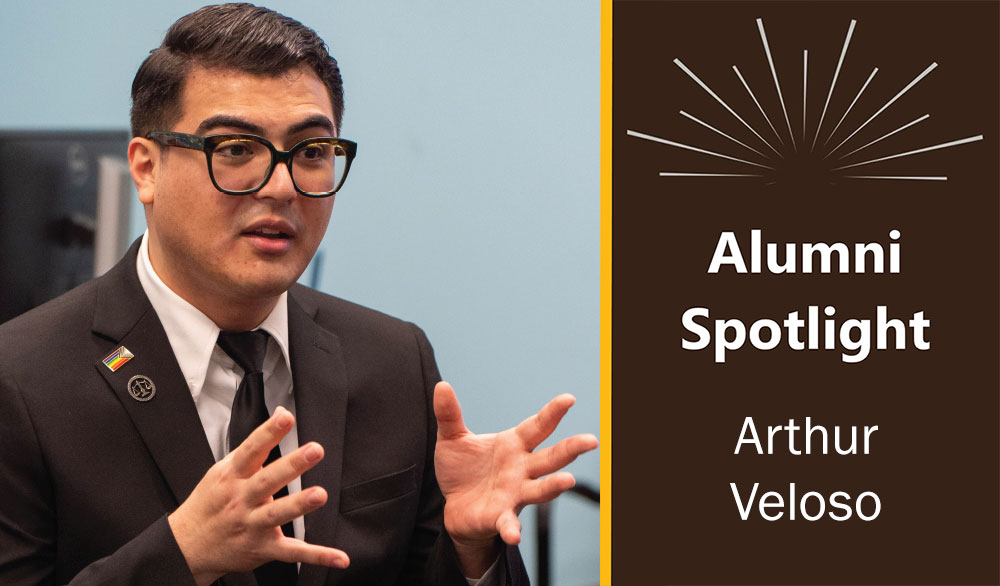Paralegal Studies
ApplyPursue Law at Skyline College
Our ABA-approved program empowers students to embrace the role of a paralegal and guides them toward opportunities to make meaningful contributions across the spectrum of private enterprises, public institutions, and nonprofit sectors.
You can complete the program 100% online! Students who choose this option must complete at least 9 paralegal course units on Zoom. Our online courses feature dynamic, human-centric, and engaging learning experiences.
Students in our 100% online program have access to all support services the College has to offer: counseling, financial aid, library services, health services, accommodations, and more.
Enroll in our paralegal program today!

Paralegals may not provide legal services directly to the public, except as permitted by law.
The Field
Our ABA approved Paralegal program provides a challenging academic experience in a highly supportive environment, and prepares students to work as a paralegal in the private, public, and nonprofit sectors.
The Paralegal Program combines English, Counseling, and Paralegal courses to prepare and provide you with the opportunities to:
- Develop the skills you need to excel as a legal professional,
- Earn a Certificate of Achievement which provides a head start on the road to employment,
- Fulfill the requirements for an Associate Degree to complete the path for transfer to a four-year institution,
- Prepare for law school.
Paralegal graduates cannot give legal advice, appear in court, or otherwise engage in the unauthorized practice of law. The practice of law by non-attorneys is strictly prohibited by law.
Career Outlook
A job as a paralegal in California can be the start of a career in the fast-paced legal field. Preparation for a career as a paralegal starts with enrollment in a college paralegal program. The U.S. Bureau of Labor Statistics provides stats and information on legal professions in the state of California and throughout the country.
Skyline College’s Paralegal Internship Program
Our internship program provides students the opportunity to build professional connections, develop professional competence, and gain the professional experience needed to qualify for positions in the legal field.
Paralegal Programs
| Program | Type | Total Units |
|---|---|---|
| Paralegal, Legal Assistant | AA | 60 Units |
| Paralegal, Legal Assistant | CA | 21 Units |
Synchronous Learning Requirement: As an ABA approved program students must to take at least nine semester credits or the equivalent of legal specialty courses through face-to-face instruction on zoom or in the classroom.
Interested in attending law school? Skyline College can help. Check out our law school preparation checklist below and begin your journey from a two-year institution to a four-year institution to law school.
The strategy for getting into law school is to study hard, plan ahead, and keep your GPA up. In addition to working hard, do the following while you are at Skyline College:
- Meet with a Counselor to develop a Student Educational Plan
- Make an appointment at the Transfer Center to confirm that you are on track to transfer
- Research theLSAT and the Law School Admissions Process
Community Legal Clinic
SparkPoint and the Dream Center host the Immigration Legal Clinic. This clinic helps bridge the justice gap by providing free access to legal services for under-resourced members of the local community including Skyline College students, employees and the public. If you have a legal question, we can help you find the answer!
Project Change
Project Change at Skyline College provides referrals to statewide record clearance resources and social, emotional and academic support for formerly incarcerated and system impacted students at Skyline College.
The Advisory Committee is made up of volunteers who agree to serve as advisors to one or more career and technical programs. Members include representatives from business, labor, community agencies, faculty, students and other members.
The committee provides valuable input in areas such as curriculum development, student recruitment and placement, staff development, equipment and software, making recommendations to strengthen, expand, and improve the quality of the program.
Advisory Committee- Legal Understanding: Identify, explain, and give examples of key elements of U.S. law, legal systems, ethical considerations, and/or professional procedures
- Legal Skills: Effective perform legal skills such as research, use of technology, information literacy, communication, and critical thinking
- Legal Analysis: Critically evaluate, consider, and critique legal arguments, issues, and /or information
- Legal Ethics: Demonstrate an understanding of and ability to adhere to ethical expectations for paralegals
Synchronous Learning Requirement: As an ABA approved program students must to take at least nine semester credits or the equivalent of legal specialty courses through face-to-face instruction on zoom or in the classroom.
Internships and Careers
A job as a paralegal in California can be the start of a career in the fast-paced legal field. Preparation for a career as a paralegal starts with enrollment in a college paralegal program. An internship in a law office, a corporate legal department, or in a government agency offers experience and networking opportunities.
Skyline College’s Paralegal Internship Program provides students the opportunity to build professional connections, develop professional competence, and gain the professional experience needed to qualify for positions in the legal field.
Internship FAQ
As an intern, students may be asked to complete a variety of tasks such as maintaining files, answering phones, making copies, filing documents, and more. Interns who prove to be diligent and reliable may be entrusted with additional tasks.
The key to success is to view each task as an opportunity to learn something new. Conscientious interns will learn the skills necessary for success in the paralegal field, including organization, communication, filing, writing, research, investigation, legal technology, multi-tasking, teamwork, and attention to detail. Students participating in the internship program can expect to:
- Gain invaluable hands-on work experience in the legal field
- Apply classroom learning to real world job tasks
- Acquire knowledge, skills, and attitudes essential for professional success
- Develop a professional network in the legal community and clarify career goals
- Fulfill the experience requirement associated with many job openings
Paralegal Interns can expect to spend about 12 - 15 hours a week at an internship for about fifteen weeks. The exact number of hours and days will depend on the employer. Generally, internships will take place Monday - Friday between 8:00 a.m. and 6:00 p.m. Internships may be renewed by the mutual agreement of the student and the employer.
Skyline College will help students develop professional resumes and cover letters, find internship opportunities, and make connections with employers who have previously provided internships for Skyline College students. Previous internships have been hosted at the organizations listed below. Skyline College does not guarantee placement for student interns.
- Asian Pacific Islander Legal Outreach (APILO)
- Bay Area Legal Aid
- Community Overcoming Relationship Abuse (CORA)
- Fragomen
- Huff Legal
- Law and Mediation Offices of Margaret S. Tillinghast
- Law Office of John L. Burris
- Legal Aid Society of San Mateo
- San Francisco District Attorney's Office
- San Francisco Superior Court
- San Mateo County District Attorney's Office
- San Mateo County Law Library
- San Mateo Superior Court
What is a Paralegal?
Paralegals play a crucial role in legal practices, performing a wide range of tasks that support attorneys and contribute to efficient case management. Some examples of typical duties which paralegals perform under the supervision of licensed attorneys include:
- Legal Research and Analysis:
- Conducting thorough factual and legal research using various resources (e.g., case law databases, statutes, legal journals).
- Analyzing research findings and preparing comprehensive summaries for attorneys.
- Staying current with legal trends and changes in relevant laws and regulations.
- Case and Client Management:
- Organizing and maintaining client files, both physical and digital.
- Creating and updating case management databases.
- Coordinating with clients, witnesses, and experts to gather information and schedule meetings.
- Document Preparation:
- Drafting legal correspondence, including letters to clients, opposing counsel, and court officials.
- Preparing pleadings such as complaints, answers, motions, and briefs for attorney review.
- Composing discovery documents, including interrogatories, requests for production, and deposition notices.
- Legal Calendaring and Deadline Tracking:
- Maintaining up-to-date calendars of court dates, filing deadlines, and statutes of limitations.
- Setting up reminders for attorneys and team members about upcoming deadlines and appointments.
- Coordinating schedules for depositions, hearings, and client meetings.
- Database Management:
- Creating and maintaining subject matter databases for easy reference and case organization.
- Developing systems to track and retrieve case-specific information efficiently.
- Client and Professional Interactions:
- Communicating with clients to gather information, provide updates, and answer non-legal questions.
- Liaising with court personnel for scheduling and procedural inquiries.
- Interacting professionally with opposing counsel and their staff.
- Document Review and Analysis:
- Reviewing and evaluating various records, including medical files, business documents, and commercial records.
- Summarizing key points from lengthy documents for attorney review.
- Identifying relevant information in large volumes of discovery materials.
- Contract and Document Examination:
- Reviewing legal documents such as contracts, leases, and insurance policies.
- Identifying potential issues, inconsistencies, or areas of concern within these documents
- Preparing summaries highlighting key terms and potential risks.
- Trial Preparation:
- Organizing and indexing trial exhibits.
- Assisting in the preparation of witness files and testimony outlines.
- Coordinating logistics for trial, including technology setup and document management.
- Legal Technology Management:
- Utilizing and managing case management software and e-discovery platforms.
- Assisting with the implementation of new legal technologies in the practice.
- Billing and Timekeeping:
- Maintaining accurate records of billable hours and tasks performed.
- Assisting in the preparation of client invoices and billing statements.
- Ethics and Compliance:
- Ensuring adherence to ethical guidelines and confidentiality requirements.
- Assisting in conflict checks and maintaining ethical walls when necessary.
- Client Intake and Initial Assessments:
- Conducting preliminary client interviews to gather basic case information.
- Assisting in the evaluation of potential new cases.
- Legal Writing:
- Drafting legal memoranda summarizing research findings.
- Preparing initial drafts of legal articles or client newsletters.
These duties showcase the diverse and integral role paralegals play in legal practices, requiring a combination of legal knowledge, organizational skills, attention to detail, and professional communication abilities.
Paralegals work everywhere. The traditional law office remains the most popular choice for beginning paralegals but it is not the only choice. Paralegals are defined by the nature of their work and not only their job title. You will find paralegals in corporate legal departments, banks, government agencies, real estate offices, public interest and legal aid organizations, and private industry.
Paralegals can also work as non-lawyer advocates representing persons before administrative agencies. The career path for paralegals in the 21st Century is still evolving. Law firms continue to try to find ways to meet client needs and lower the costs involved with running a business. Paralegals are a cost effective way to serve client needs and increase revenue for a law firm.
While employer expectations for hiring paralegal vary, most large firms require a BA and a Paralegal Certificate for all positions as career paralegals. Some employers will hire case clerks without a BA who have completed an academic paralegal certificate program. Some “non-career” paralegal jobs are available for college graduates with BA degrees.
Employers' expectations for paralegal education typically include:
-
Formal Education: Most employers expect paralegals to have at least an associate's degree in paralegal studies or a bachelor's degree in a related field. Some may prefer a bachelor's degree.
-
ABA Approval: Many employers value programs approved by the American Bar Association (ABA), as these meet specific quality standards.
-
Legal Specialty Courses: Employers expect paralegals to have completed courses in various legal specialties such as civil litigation, legal research and writing, and law office technology.
-
Technology Skills: Proficiency in legal software and general office technology is often required.
-
Research and Writing Skills: Strong abilities in legal research and writing are crucial.
-
Practical Experience: Internships or practical experience gained during education are often highly valued.
-
Soft Skills: Critical thinking, communication, organization, and attention to detail are important soft skills employers look for.
-
Ethics and Confidentiality: Understanding of legal ethics and the importance of confidentiality is crucial.
Yes! The Paralegal Program can prepare you for law school. In fact, in recent years a fair number of our graduates have gone on to complete law school, pass the Bar Exam, and successfully become attorneys. Check out our law school preparation checklist below and begin your journey from a two-year institution to a four-year institution to law school.
The strategy for getting into law school is to study hard, plan ahead, and keep your GPA up. In addition to working hard, do the following while you are at Skyline College:
- Meet with a Counselor to develop a Student Educational Plan
- Make an appointment at the Transfer Center to confirm that you are on track to transfer
- Research the LSAT and the Law School Admissions Process
- Make an appointment to speak with the Paralegal Program Director to learn more by emailing socialsci-creativearts@smccd.edu
Law, Public Policy, and Society AA for Transfer
Our interdisciplinary legal studies degree introduces students to the legal field, prepares students for further study in a variety of majors, and is an excellent choice for students considering careers in law, government, or non-profit management.
Career Opportunities
Prepares students for career opportunities in law, policy making, government, legislation/lobbying, and public affairs. Students with the AA-T may seek employment as a legal assistant, a legislative aide, a classroom aide, or as an administrative assistant in a nonprofit or government office.
Program Learning Outcomes
Upon Completion of Degree requirements, students will be able to: Analyze historical and current events using social science concepts, frameworks, and theories. Produce and articulate evidence-based arguments regarding debates and disputes in law, policy, and politics. Demonstrate a commitment to challenging social, cultural, and economic inequalities arising from any differential distribution of power, resources, and privilege.
| Program | Type | Total Units |
|---|---|---|
| Law, Public Policy, and Society | AA-T | 60 Units |


